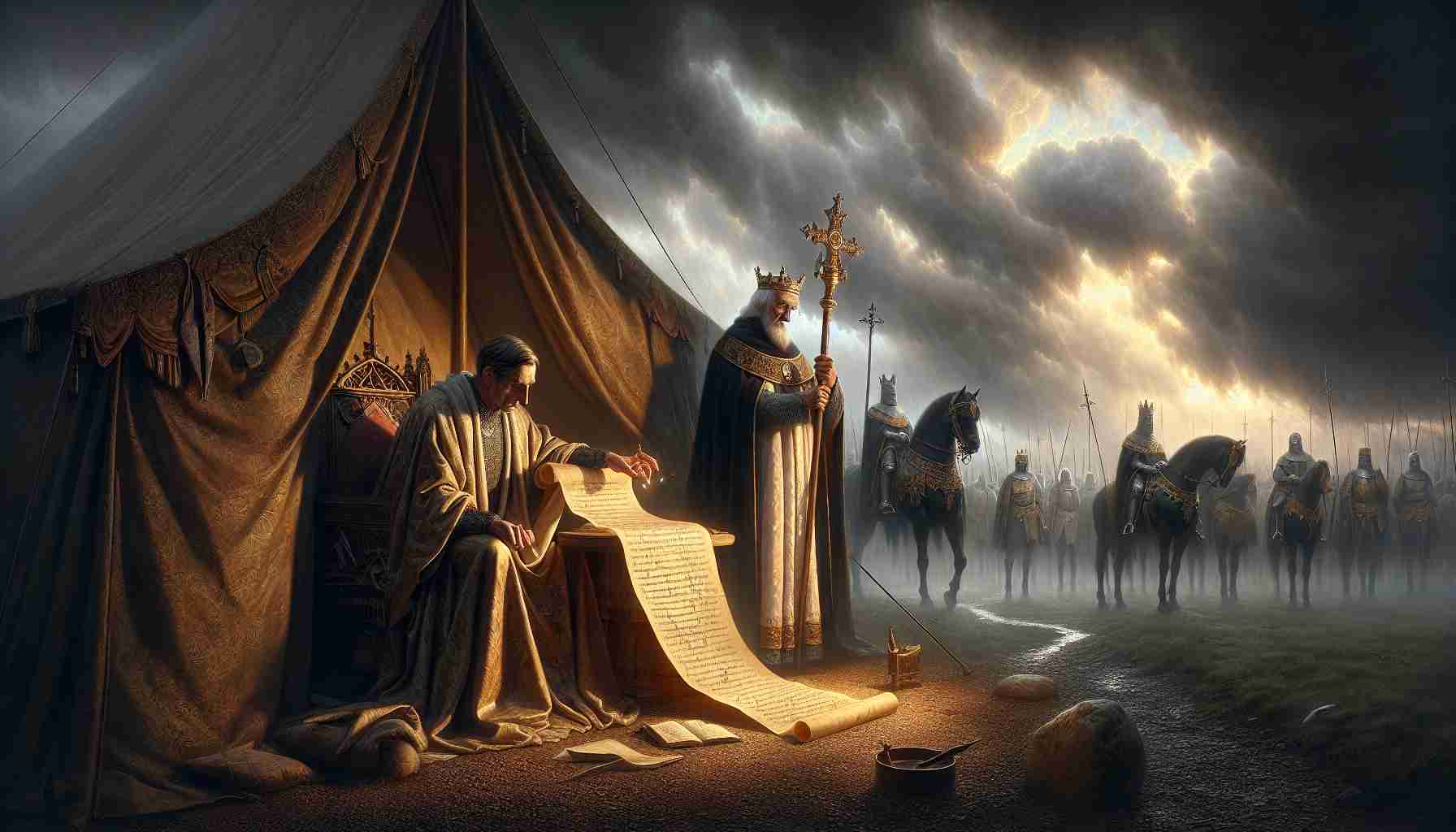

A bitter wind blew across the flat plain of Runnymede, rippling the canvas of the royal tent like the breath of God stirring chaos into order. The Thames floated sluggish beside the meadow, dark as ink under shifting clouds. On this morning—June 15, 1215—the weight of centuries seemed to hang in the air, cloaked in murmurs of dissent and prayer.
Inside the tent stood King John of England, brooding beneath the canopy of gold-stitched lions. His face, pale and pinched, betrayed no hint of monarchy’s divine right. He clung to his scepter not like a symbol of power but as a drowning man clutches driftwood. Before him, rows of barons in iron and wool, swords visible, spirits restless, demanded that the rule of law curb the tyranny of the crown.
Behind them stood one cloaked not in steel but in Scripture—Stephen Langton, Archbishop of Canterbury. His voice had no edge of a blade, but its weight had worn even monarchs into submission. When fear had wrapped itself around England like fog, it was Langton who recalled the words of Isaiah: “Learn to do right; seek justice. Defend the oppressed.” That voice had thundered no less than a prophet amidst the court’s silence, challenging John to hold law sacred, not as a king’s whim but as a reflection of God’s righteousness.
Yet John had resisted.
Since he had broken with Pope Innocent III and seized Church lands, the weight of excommunication had dangled from his crown like a chain. The barons, emboldened by Church support and weary of royal excess, laid their demands upon parchment—sixty-three clauses inked like divine statutes. Among them, the Church’s freedom, relief from arbitrary taxes, and a council of barons to hold the king accountable. It was to be called Magna Carta.
Quill in hand, the king stared down at the document as though it were an altar stone bearing his own confession. His pride recoiled, yet Langton's presence, calm as stone, gave him no escape. Just beyond the tent walls, the barons' men waited with spears grounded in earth like roots of the old law.
There was no thunderclap when the seal met the wax. No angel singing. Just a long, exhaled breath—as if creation itself sighed. The seal bore down with finality, and the gold thread passed through the parchment like a covenant stitched not merely between man and man, but perhaps between man and God.
Outside, the sky began to clear. Light broke through clouds in solemn beams, warming the steel caps of baronial warriors. Some crossed themselves. Others simply looked toward the tent, unsure what had just occurred—but knowing their world had shifted.
Langton remained, watching as the king sat back, his hands trembling. The Archbishop offered no triumph, merely closed his hands as one in prayer.
“This is not the end,” John muttered, eyes flicking upward.
“Nor is it yet justice,” Langton replied. “But it is the beginning of it.”
The meadow would remember. Centuries hence, when parchment would turn brittle and words rewritten in laws far and wide, the memory of that day would stand like a pillar. Liberty, born not of rebellion alone but of righteousness pursued with quiet faith, had taken its first breath.
Magna Carta granted no perfect peace. Within months, civil war would erupt, the king would appeal again to Rome, and many clauses would be annulled. But the seed had taken root.
Buried within Clause 1 was a principle that would not die: “The English Church shall be free.” A statement filtered through Langton’s hand and heart, grounded in more than law—in belief. These concepts, once radical, would echo across oceans and ages, written into constitutions, defended by martyrs, and woven through the prayers of reformers and revolutionaries.
On the edge of the clearing, monks from nearby Staines Abbey took to quiet prayer, blessing a parchment they would later shelter in their scriptorium. Perhaps they did not see a revolution within it, but rather obedience—a fractured king kneeling, however briefly, to the higher command of justice.
In the years after, kings would rise and fall, parliaments form and disperse. The Charter would be reissued, reduced, restored, and finally revered. It would inspire the Petition of Right, the English Bill of Rights, and later, the U.S. Constitution. Each generation would look back to the windswept field and see not rebellion—but repentance. Not merely revolt—but reformation.
Isaiah’s call echoed still. “Seek justice. Defend the oppressed.” That morning, it was etched into the legacy of a nation.
And Runnymede, nondescript and plain, became a sanctuary of sorts—not of brick or stone—but of truth.